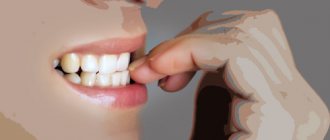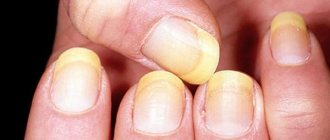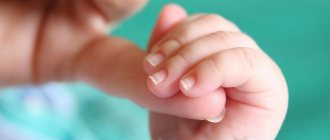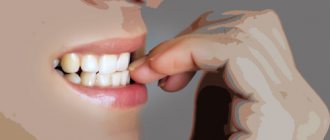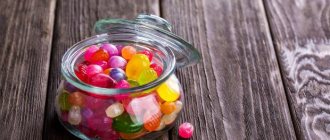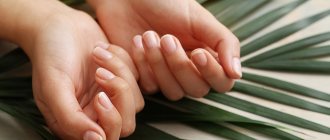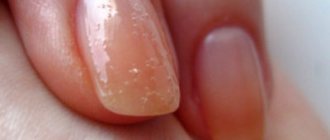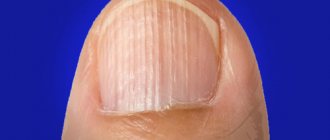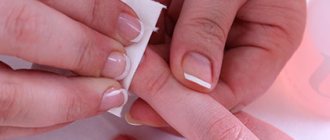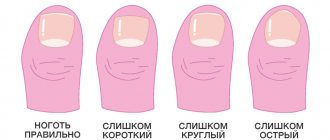The habit of biting nails usually appears in a child as a reaction to stress, but can persist even after the stress factor has gone. This is the case with many bad habits - at first they help you get through some difficult situation, and then it’s not easy to get rid of them. What should parents do if their children bite their nails?
Nail biting is a habit that affects 25% of children (and 15-20% of teenagers). It looks, to put it mildly, unpleasant: both the nail itself and the thin skin around it are damaged, and dirt and germs can easily get into the wounds. It’s a pity for the fingers, and there is a hygiene problem here, not to mention the fact that fragile baby teeth can also suffer.
There is an opinion that the tendency to bite nails is inherited, so the first thing we advise you to do is remember your own childhood - it was like that, admit it? And if so, what helped you overcome the habit?
Some psychologists believe that this is a kind of replacement for sucking a pacifier and thumb - just more socially acceptable. The sooner you notice this habit, the easier it will be to break, so start gently intervening as soon as you notice it.
Reasons for the habit
The reasons why a child bites his nails are very different; in some cases it is just a habit, in others it is a consequence of mental trauma.
According to child psychologists, the reasons for the appearance of such a habit may be:
- Anxiety;
- Stressful situations;
- Auto aggression;
- Brittle nails;
- Imitation;
- Transformation when trying to get rid of another bad habit;
When watching TV or using gadgets, the child cannot find something to do.
If parents notice that their child has developed this habit recently, to establish its cause, it is recommended to write it down in a notebook and observe it every time the child starts biting his nails.
Reasons why a child bites his nails
In order to cope with the problem, it is imperative to find out the reason for this habit. It does not appear on its own out of nowhere; it is necessarily preceded by certain circumstances. Experts dealing with this problem believe that when a child bites his nails, he is trying to “gnaw out” something that haunts him, frightens him, or interferes with him. Psychologists believe that the root of the problem should be sought in a period of up to 1.5 years. According to Freud, this is the age of the oral stage of development, and if at this moment a traumatic event occurred for the child (mother’s departure, rough weaning, etc.), that is, the child’s unsatisfaction of the basic need for nutrition is fixed, then later, in a more At an older age, a push will be enough for suppressed dissatisfaction to surface and take shape in the bad habit of biting nails.
Photo source: shutterstock.com
The reasons why there is an obsessive desire to bite your nails can be both psychological and physiological.
Psychological reasons:
- if the child was weaned early or was forbidden to suck the pacifier, then the suppressed need for sucking will be satisfied in this way;
- a sudden change of environment - moving to a new place of residence, moving to another kindergarten or school is a great stress for the child;
- the loss of a loved one - again, this is a strong stress that can become an impetus;
- a tense situation in the family - conversations in a raised voice, aggression of parents towards each other, scandals, threats - all this traumatizes the child’s psyche;
- fright - a loud scream or sound, or some frightening event or incident can frighten a baby;
- problems with social adaptation - for a child after three years of age, entering kindergarten or school, communicating with new people, changing the daily routine - all this is a stressful situation;
- heavy workload - an abundance of sections, clubs, heavy workload at school, classes with a tutor - all this can become an unbearable burden on the baby’s nervous system;
- suppressed aggression (auto-aggression) – the child suppresses aggression, directs it inward, towards himself;
- a small load is the other extreme, as opposed to the previous point, when the child simply does not know what to do with himself;
- a bad example - if someone around a child, especially an older one, bites his nails, then we can say with confidence that the bad habit will quickly be adopted;
- uncontrolled watching of TV and computer games, as well as the uncontrolled use of various gadgets (phones, tablets, etc.) put an increased burden on the child’s psyche - now both in cartoons and in games you can find an excess of aggression, perhaps the child is trying to cope with stress from watching and therefore bites his nails;
- fear of not meeting the expectations of the parents - the child experiences a lot of stress, trying to meet expectations and trying to meet the requirements of the parents.
At the root of all psychological causes lies a stressful situation, the origins of which must be dug to the root in order to successfully get rid of a bad habit.
Physiological reasons:
- violation of the daily routine - lack of sleep, eating at random times, uncontrolled free time and workload - all this leads to exhaustion of the baby’s nervous system;
- poor nutrition – lack of a balanced diet, especially the abuse of sweets, leads to reduced stress resistance of the child’s body;
- lack of vitamins and minerals - to maintain the nervous system, it is necessary not only to have a balanced diet, but sometimes to take additional vitamin and mineral complexes;
- violation of hygiene standards - lack of regular hygiene procedures can also cause a bad habit;
- weak nervous system – tendency to neuroses and hereditary diseases, increased nervous excitability, etc.;
- parasites – helminthic infestation leads to constant intoxication of the child’s body, which leads to anxiety, which the child tries to relieve by biting his nails. Since eggworms often accumulate under the nails, re-infection occurs, the situation closes and repeats itself endlessly;
- brittle and peeling nails - by biting nails, the child tries to get rid of debris and hangnails, remove protruding and traumatic parts, gradually this becomes a habit.
Photo source: shutterstock.com
Solutions
When choosing recommendations on how to wean yourself from a bad habit, the behavior of the parents themselves is very important. Do not yell at your child, scold him or hit him in the arms. Such behavior not only does not help to get rid of the habit, but will only scare the child, he will learn to do it not in the presence of his parents, but secretly.
Therefore, any actions of parents in this situation should be with love, words of support should be pronounced with tenderness in a calm tone. Let's look at specific ways to solve the problem.
Eliminating stress
It is necessary to analyze at what point the child began to behave this way. What events did he experience before this? Perhaps the child witnesses quarrels between parents or experiences severe stress for another reason.
- To get rid of this habit, you need to try to either eliminate the stress factor or limit it as much as possible from such situations.
- Of course, it is not always possible to completely eliminate stressful situations from life.
- In this case, you need to have a confidential conversation with the child, tell him what exactly is happening in the family and for what reasons. Give him support, hug him.
Agreement with the child
Perhaps, with the help of nail biting, the child survived a stressful situation in the past, but the habit remained. In this case, you can try to agree with the child that, for example, if he goes without this action for a certain time or if you can cut all his fingernails, then you promise to buy him a long-desired toy or perform another pleasant action for him.
For example, go to your favorite cafe or to the cinema for the long-awaited premiere.
- The child is not yet as disciplined as an adult and it may take time to overcome this. There may be some disruptions at first.
- In such situations, the main thing is not to scold the child or reprimand him, but to support him and again promise him something pleasant if he stays without a bad habit for a certain period of time.
If this is just a habit and not the result of a psychological problem, with the support of his parents he will be able to cope with this problem.
How to unlearn a bad habit
It is quite possible to get rid of a bad habit, the main thing is to want it yourself. There are several effective ways that you can use to stop biting your nails once and for all.
- When a person bites his nails, he should distract himself with some useful chores around the house.
- To rid yourself of a bad habit, just read an interesting book or magazine. Some experts recommend getting yourself interested in eating fruits, which is good for the body.
- If a person is very nervous and wants to put his fingers to his mouth, a walk in a pleasant company of friends will be a good salvation in this situation.
- Experts recommend that girls go to a beauty salon and get their nails done beautifully. With every urge of a bad habit, the young lady will be held back by a magnificent manicure on her fingers.
- No less effective is the option of using bitter varnish applied to the nail plates. Consistent use of the product will stop a woman from a bad habit. You should apply the polish until the desire to bite your nails completely disappears.
- From a medical point of view, it is necessary to get rid of the habit of biting your nails. At the moment when a person bites his nails, he does not think about sterility. Therefore, he can pick up any infection. In such cases, it is worth thinking about some terrible disease that can overtake you if you do not say goodbye to the habit.
- A good solution would be nail extensions, in which the surface is covered with gel. The plates become so strong that it will be difficult to bite off even a small piece of the nail. In addition, no girl wants to spoil the beauty on her fingers, for which a lot of money has been spent.
- It is worth arguing with a friend or friend on a topic related to this bad habit. You must promise not to bite your nails for at least a week for a certain reward or a trip to a cafe.
- Some people manage to put mustard on their nails so as not to bite anymore.
- Soap will be no less effective. You need to scrape it with your nails. When bringing fingers to the mouth, a person will experience unpleasant sensations and taste. After the first time there will already be noticeable progress.
- When you feel the urge, you should put a rubber ring in your mouth for teething babies.
- Try to control yourself, monitor your own actions, show willpower, and then you will gradually wean yourself off the bad habit.
- You can warn friends or relatives about hitting your hands when your finger reaches for your mouth.
- Some people recommend lubricating the nail plates with iodine.
- Every time you feel the urge to bring your fingers closer to your mouth, think about the beauty of your hands. After all, chewed off nails look terrible and cause pure disgust.
- It will be useful in this situation to argue with yourself. Set fines for each nail bitten off. This could be repeated push-ups, a grueling long distance run, and much more. The main thing is to torture yourself so that next time you don’t want to put your fingers to your mouth.
- Salty hand baths are also useful in this case.
- A small nail file will help you get rid of an unpleasant habit. Carry it with you and use it immediately the next time you feel the urge.
- Some people have a habit of biting their nails very short. It is possible to unlearn it. To do this, you need to apply false nails for several weeks.
- Learn to control your emotions, understand the reason for your worries and bad mood. It is recommended to take deep breaths and exhales for 20 seconds.
- In the current situation, be less upset and nervous. You should approach the problem philosophically and look at it from the outside. It is useful to drink soothing teas, infusions, and take baths with added oils. All this will help you relax and forget about the bad habit.
- If an adult is unable to unlearn such a habit, his own child will help him. At such moments, remember that children strive to copy their parents in everything. What example does a nail-biting mother of a young daughter set? These thoughts should force the parent to give up the bad habit.
- None of the above methods help? A person doesn’t know how to stop biting his fingernails? Then it’s worth paying a visit to a psychologist.
Games
To overcome stress, it is recommended to carry out psychological relief. For children, the most interesting and understandable format is a game format. Any constructor can be used.
You can show your imagination and come up with other games. According to the advice of psychologists, this is:
- Playing with sand. An adult’s hand is buried in the sand, the child must dig it up without touching the hand;
- Game with gloves. Various small objects are placed in ordinary gloves, and the child plays with them at least once a day;
- Game Pull. Prepare small strips of adhesive tape, stick them on the playing surface, and the child’s task is to tear them off. After all, it often happens that children not only bite their nails, but also tear them off, and this game provides an alternative to this activity.
Set up a daily routine
The reason for such a bad habit may be an incorrect daily routine. It needs to be analyzed and possibly revised.
Maybe you need to reduce the number of additional activities, you need to reduce the time you watch TV and use gadgets, they excite the nervous system. It is better to devote time to other more active games and walks.
Massage
When the question arises of how to stop a small child from biting his nails, a massage method of distraction can help. When parents notice that the baby has begun to bite his nails, you need to gently remove his hands from his mouth and massage with light pressure.
You can find another effective method of diverting a child’s attention from unwanted behavior. The main thing is to do these actions regularly.
Why should you not bite your nails or bite off hangnails?
First of all, it's unhygienic. A person who bites his nails causes hostility and condemnation from others. Secondly, onychophagia is a habit that is dangerous to health.
Leads to the following complications:
- Deformation, thinning, delamination of the nail plate, inflammation, suppuration of the skin around the nail;
- Entry into the oral cavity of pathogenic pathogens that are located in the area under the nails and on the fingertips. As a result, a person becomes infected with gastrointestinal infections, suffers from indigestion or poisoning with a high fever;
- Fungus (onychomycosis). Injury to the nail area by bites and a humid environment create favorable conditions for the penetration and proliferation of fungus, which leads to deterioration of the condition of the nails and even their loss;
- Dental problems. The habit causes inflammation of the gums, damage to teeth (chips, displacement, destruction), dysfunction of the temporomandibular joint;
- Ingrown nail. With constant gnawing, the direction of growth of the plate changes, which leads to its ingrowth into the lateral nail folds.
Why else is it harmful and should not bite your nails? Their main function is to protect the end phalanges of the fingers from mechanical damage. If the integrity of the plate is violated, the nail bed will become vulnerable and easily injured.
"Gnaw" method
When the problem arises of how to stop biting nails at 4 years of age and older, psychologists recommend the “reverse method.” In your daily schedule, you need to enter a separate period of time allotted for the habit.
When this time comes, the child is distracted from his activities at that moment and told that this time has come and he can bite his nails. The habit turns from a taboo into a legal activity and becomes no longer so interesting and attractive.
How to get rid of the habit of biting nails for a teenager
Well, how can a teenager of 12 or 14 stop biting his nails? That’s the question parents ask. During adolescence, children are less trusting of adult advice. At the same time, they understand perfectly well that biting nails is ugly and harmful. How can teenagers get rid of this scourge on their own?
- It’s worth taking a closer look at the fingers of friends, girlfriends, brothers or sisters whose nails are in perfect order and comparing them with your own.
- You need to understand that a teenager with bitten off nails will cause hostility and disgust among those around him.
- Use a band-aid. Stick small pieces on each nail and do not remove. Change only after water procedures. This is done as a punishment for naughty fingers.
- Have a small ball, an elastic band or a penny with you. Occupy your hands with these objects at moments when your fingers reach for your mouth.
- A good option is to paint the plates with bright varnish if we are talking about a girl. For boys, you can use essential oil with an unpleasant aroma, such as fir or thyme.
Any of the methods described above will help you quickly get rid of the habit of biting your nails. It is important to believe in yourself and show willpower.
Be healthy!
Going to the doctor
Parents are often concerned with the question of whether it is worth contacting a doctor about such a problem. If the methods listed above did not help, and you were unable to cope on your own, it is recommended to visit a neurologist and psychologist. After all, the emergence of such a habit is a signal that the psyche cannot cope on its own.
There are many reasons for the habit of biting nails. It is important to identify the cause in a particular case, because serious psychological trauma can be hidden behind a common habit.
And if they are not detected and resolved in time, in adult life the situation can turn into various complexes and more serious psychological problems.
Why nail biting is considered a bad habit
Dr. Komarovsky believes that any bad habits are formed as a repeatedly repeated sequence of certain actions. Over time, the brain ceases to control them, these actions become reflexive. Without wanting it or noticing it, the child puts his hands in his mouth, pulls his earlobe, pulls his hair, swings his legs, and picks his nose. The danger is that children’s habits shape the character of an adult, who is much more difficult to wean than a child.
Harmful actions are those that can cause harm. Doctors also see a danger in the habit of biting nails for a number of reasons:
- Nails have a protective function, protecting the fingertips, the most vulnerable areas, from damage. Constantly nibbling them to the very root leads to the fact that the skin on the fingers becomes very thin and sensitive. This threatens injury and inflammatory processes not only of the skin around the nail plate, but also of the deeper layers.
- The appearance and color of nails gradually changes, they become brittle, become very peeling, deformed, and in some children they stop growing altogether.
- Pathogenic microorganisms enter cracks and wounds from the oral cavity, which can cause inflammation and infection. If bacteria enter the bloodstream, it can cause serious illness, including sepsis.
- Much more often the opposite happens. Dirt from under the nails, where viruses and bacteria that get there actively multiply, is swallowed by a child when he bites his nails. There is also a high risk of infection with worms.
- A child’s nail often injures the soft tissues in the mouth, thereby causing stomatitis. Damage to tooth enamel leads to tooth decay.
Although it is not customary to make psychiatric diagnoses before the age of 18, doctors clearly consider the habit of biting nails to be a disorder, which even received a medical name - onychophagia.

